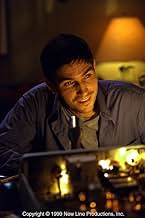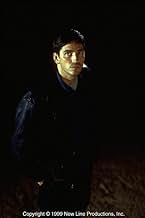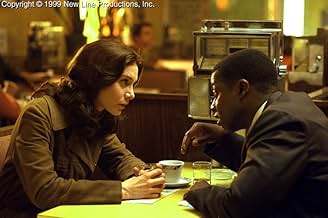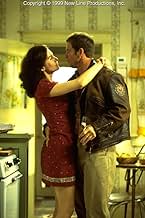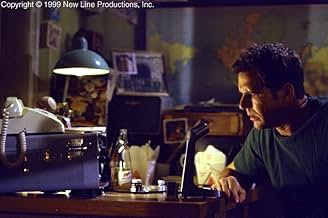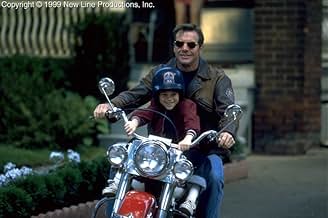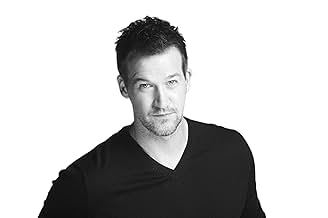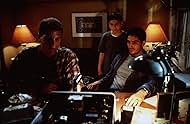Un lien radio traversant accidentellement le temps relie un père et son fils à 30 ans d'intervalle. Le fils tente de sauver la vie de son père, mais doit ensuite gérer les conséquences.Un lien radio traversant accidentellement le temps relie un père et son fils à 30 ans d'intervalle. Le fils tente de sauver la vie de son père, mais doit ensuite gérer les conséquences.Un lien radio traversant accidentellement le temps relie un père et son fils à 30 ans d'intervalle. Le fils tente de sauver la vie de son père, mais doit ensuite gérer les conséquences.
- Récompenses
- 2 victoires et 8 nominations au total
Histoire
Le saviez-vous
- AnecdotesIn the warehouse fire scene, all the firefighters except Dennis Quaid, Peter MacNeill and Jordan Bridges are real.
- GaffesDuring a 1969 sequence, a wide-angle camera scans Manhattan (from Queens). On the left, for an instant, the completed World Trade Center is visible. It was not completed in 1969.
- Bandes originalesCrimson and Clover
Written by Tommy James (as Thomas Gregory Jackson) and Peter P. Lucia Jr.
Performed by Tommy James and Tommy James & The Shondells
Courtesy of Rhino Entertainment Co.
By Arrangement with Warner Special Products
Commentaire à la une
Several films have deal with changing the past and the ensuing effects on the future. "Back to the Future", "Timecop", and "The Final Countdown" come immediately to mind. Director Gregory Hoblit (his "Fallen" (1998)and "Primal Fear" (1996) were both excellent) explores that theme again in "Frequency". But writer Toby Emmerich (in his first writing credit), puts a different spin on the theme. In most 'changing the past' films, a character goes back in time. In "Frequency", one main character lives in 1999 while another lives in 1969--and you see the actions in 1969 immediately affecting 1999. Sounds confusing, huh? Well, it is. But it works.
The movie opens with the introduction of the Sullivan family. Frank (Dennis Quaid) is a heroic New York firefighter, and escapes a harrowing situation to return home to his wife and his 6-year-old son John. It's an exciting time in New York, as the 'Miracle Mets' have made the World Series. Frank is a ham radio user, and a strange disturbance in the sky (solar flares, I believe. I never took astronomy) in the sky has really increased the range of his radio. "I'm reaching people I've never reached before", he says. Flash forward to 1999, when young John has grown up into a 36-year-old NY homicide detective (James Caviezel) with relational problems (and possibly a drinking problem as well). We learn his father died several years earlier in a warehouse fire, and it's obvious that John has never really gotten over it. He ends up setting up the old ham radio (did I mention that the solar flares are back?), and contacts a fellow New Yorker named Frank. It certainly won't ruin any big surprise when I tell you that it's his father Frank--in 1969. After recovering from his astonishment and convincing his father who he really is (his knowledge of the 1969 World Series proves quite helpful), they begin a series of nightly conversations. Unfortunately, their conversations change the past--and the future--in very dangerous ways. A serial killer who should only have 3 victims suddenly has more, and John must use his knowledge of the crimes (30 years old to him) to guide his dad in a 1969 pursuit of the killer. And the chase is on. Will they stop the killer? Will the solar flares last long enough for them to finish their plan? Will anyone in 1999 or 1969 believe them?
That lengthy 'plot summary' really didn't ruin any of the suspense--or come close to explaining the whole story. So, it goes without saying that the story is pretty convoluted and involved. But it's not hard to follow, and the movie grabbed me and kept me interested throughout. Granted, you will need to use a serious amount of 'suspension of disbelief'. If you get hung up on "there's no way they could be talking to each other" or "changes in the past wouldn't immediately appear in the future--they would have already happened and would have been there all along", you'll do 2 things: (1) you'll give yourself a headache, and (2) you'll miss out on a very entertaining film. The reason I gave this more stars than last week's "U-571"? I cared about the characters, and I found "Frequency" much more entertaining. Also, the story was quite original--with great use of the Miracle Mets and the 1969 World Series throughout.
Speaking of the characters--Quaid and Caviezel both do great work. Their conversations via radio are very touching and authentic (once you accept the general premise, of course). Although Quaid is a 'movie star', don't let that fool you--he's a very good (and probably underrated) actor. Just watch him as Doc Holliday in "Wyatt Earp" (1994), Remy McSwain in "The Big Easy" (1987), or Gordo Cooper in "The Right Stuff" (1983) if you don't believe me. And Caviezel's a real up-and-comer (1998's "The Thin Red Line"). He does a great job as a grieving son who is reunited (in a way) with his father, but watches his joy dissipate in the face of the mess he's created. He also believably portrays a character who has memories of the way things were, but is now bombarded with 'new' memories of the way things have become. The other characters are definitely secondary, but Elizabeth Mitchell as wife/mom Julia, and Andre Braugher (TV's "Homicide", 1998's "City of Angels", and 1989's "Glory") as Frank's policeman friend Satch are both solid.
This film has some decent action/suspense scenes, and 1999 John's radio conversation with his buddy Gordo (in 1969) is very funny. There have certainly been better action/suspense/serial killer movies (the action scenes weren't amazing, the story has some holes, and I thought the ending was a little cheesy), but the heart of the film is the relationship between Frank and John. I bought into that relationship fully, and that's why I liked this film as much as I did. And that's why I definitely recommend seeing "Frequency".
The movie opens with the introduction of the Sullivan family. Frank (Dennis Quaid) is a heroic New York firefighter, and escapes a harrowing situation to return home to his wife and his 6-year-old son John. It's an exciting time in New York, as the 'Miracle Mets' have made the World Series. Frank is a ham radio user, and a strange disturbance in the sky (solar flares, I believe. I never took astronomy) in the sky has really increased the range of his radio. "I'm reaching people I've never reached before", he says. Flash forward to 1999, when young John has grown up into a 36-year-old NY homicide detective (James Caviezel) with relational problems (and possibly a drinking problem as well). We learn his father died several years earlier in a warehouse fire, and it's obvious that John has never really gotten over it. He ends up setting up the old ham radio (did I mention that the solar flares are back?), and contacts a fellow New Yorker named Frank. It certainly won't ruin any big surprise when I tell you that it's his father Frank--in 1969. After recovering from his astonishment and convincing his father who he really is (his knowledge of the 1969 World Series proves quite helpful), they begin a series of nightly conversations. Unfortunately, their conversations change the past--and the future--in very dangerous ways. A serial killer who should only have 3 victims suddenly has more, and John must use his knowledge of the crimes (30 years old to him) to guide his dad in a 1969 pursuit of the killer. And the chase is on. Will they stop the killer? Will the solar flares last long enough for them to finish their plan? Will anyone in 1999 or 1969 believe them?
That lengthy 'plot summary' really didn't ruin any of the suspense--or come close to explaining the whole story. So, it goes without saying that the story is pretty convoluted and involved. But it's not hard to follow, and the movie grabbed me and kept me interested throughout. Granted, you will need to use a serious amount of 'suspension of disbelief'. If you get hung up on "there's no way they could be talking to each other" or "changes in the past wouldn't immediately appear in the future--they would have already happened and would have been there all along", you'll do 2 things: (1) you'll give yourself a headache, and (2) you'll miss out on a very entertaining film. The reason I gave this more stars than last week's "U-571"? I cared about the characters, and I found "Frequency" much more entertaining. Also, the story was quite original--with great use of the Miracle Mets and the 1969 World Series throughout.
Speaking of the characters--Quaid and Caviezel both do great work. Their conversations via radio are very touching and authentic (once you accept the general premise, of course). Although Quaid is a 'movie star', don't let that fool you--he's a very good (and probably underrated) actor. Just watch him as Doc Holliday in "Wyatt Earp" (1994), Remy McSwain in "The Big Easy" (1987), or Gordo Cooper in "The Right Stuff" (1983) if you don't believe me. And Caviezel's a real up-and-comer (1998's "The Thin Red Line"). He does a great job as a grieving son who is reunited (in a way) with his father, but watches his joy dissipate in the face of the mess he's created. He also believably portrays a character who has memories of the way things were, but is now bombarded with 'new' memories of the way things have become. The other characters are definitely secondary, but Elizabeth Mitchell as wife/mom Julia, and Andre Braugher (TV's "Homicide", 1998's "City of Angels", and 1989's "Glory") as Frank's policeman friend Satch are both solid.
This film has some decent action/suspense scenes, and 1999 John's radio conversation with his buddy Gordo (in 1969) is very funny. There have certainly been better action/suspense/serial killer movies (the action scenes weren't amazing, the story has some holes, and I thought the ending was a little cheesy), but the heart of the film is the relationship between Frank and John. I bought into that relationship fully, and that's why I liked this film as much as I did. And that's why I definitely recommend seeing "Frequency".
Meilleurs choix
Connectez-vous pour évaluer et suivre la liste de favoris afin de recevoir des recommandations personnalisées
- How long is Frequency?Alimenté par Alexa
Détails
Box-office
- Budget
- 31 000 000 $US (estimé)
- Montant brut aux États-Unis et au Canada
- 45 010 278 $US
- Week-end de sortie aux États-Unis et au Canada
- 9 025 584 $US
- 30 avr. 2000
- Montant brut mondial
- 68 106 245 $US
- Durée1 heure 58 minutes
- Couleur
- Mixage
- Rapport de forme
- 2.35 : 1
Contribuer à cette page
Suggérer une modification ou ajouter du contenu manquant

Lacune principale
What was the official certification given to Fréquence interdite (2000) in Japan?
Répondre

